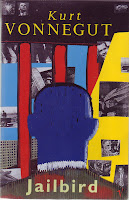
Having enjoyed the story of the time travelling war veteran alien abducted character in Kurt Vonnegut’s Slaughterhouse 5 it was with some trepidation this book was picked up. Not because Slaughterhouse was bad, far from it, but because you just didn’t know what was coming.
This book has a similar feel with the main character Walter Starbuck reviewing his life and the mistakes that led him to be a widower in prison without friends or future prospects. The difference is that the flashbacks are done without the help of alien intervention and unlike the lead in Slaughterhouse Starbuck does not know what will become of him from the moment he is escorted out of the prison gates by president Jimmy Carter’s cousin.
After that moment there is an interweaving of different stories about Starbuck's youth, career in the Nixon administration, marriage and his status as a despised sneak who ruined the career of one of his friends by mentioning they had both been in the communist party when grilled by the authorities.
Throughout the narrative there are constant references to a multinational corporation RAMJAC that owns everything from Vogue to McDonalds. Vonnegut brings the connection to Starbuck via the mysterious owner of the corporation who turns out to be one of Starbuck’s first girlfriends who saves him from destitution by appointing him as a vice president of the corporation.
But the reason why this book sticks in the mind because of the clever way it approaches some of the big debates in US politics and society. Is capitalist greed right or is a more socialist alternative the answer? If you are influential enough will you ever be really punished by the state? Is Jesus the answer for those who have nothing?
Then there are other more personal questions that he raises. What makes you successful - is it by sucking up to the right people or actually doing a good job? What constitutes personal success and can you be happy with no possessions?
Starbuck is a mirror not only to those debates but also challenges them by being part of the guilty Nixon administration, serving time, but also looking in from a position almost on the outside. Just like Billy in Slaughterhouse Starbuck seems to have his own morale compass and drifts through life frustrating those around him who are seeking to make him conform.
At the end of the book Starbuck is heading back to prison but this time, because it is seen to be for reasons that benefited rather than injured his friends, he is given a send off. The biggest question of all is whether or not a corrupt country is able to punish anyone and if those trying to turn the tide and share the wealth will ever manage to make a difference. Those are weighty questions and the fact that Vonnegut gets them across without preaching is a testament to the ability of his style.







